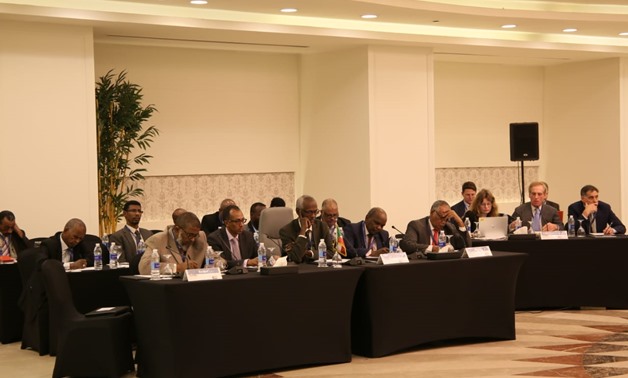
The first round of the second meeting of the water and irrigation ministries of Egypt, Sudan and Ethiopia on the mechanism of operation and filling of the Grand Ethiopian Renaissance Dam (GERD) held on Dec. 2 - Press Photo
CAIRO - 11 May 2020: Ethiopia has almost completed the construction of the Grand Ethiopian Renaissance Dam (GERD) across the Blue Nile, which is shared by Egypt, Ethiopia, and Sudan, and is the largest tributary of the Nile River. With a maximum water storage capacity of 74 billion cubic meters and a total energy generation capacity of 6450 megawatts, the GERD is slated to become the largest hydropower dam in Africa.
To put things in perspective, the GERD can produce over three times more power than the Hoover Dam, and can store twice as much water as Lake Mead, which is the largest artificial reservoir in America. In short, the GERD is a project of mammoth proportions.
Under international law, a dam of this magnitude should only be constructed, filled, and operated in coordination with downstream riparians who will be invariably affected by this project. For Egypt, reaching an agreement on the GERD is not only a matter of legal obligation; it is an imperative of survival. Egypt, a nation of over 100 million, is one of the most arid countries in the world and is entirely dependent on the Nile River as its sole source of livelihood.

Unfortunately, however, Ethiopia’s posture throughout almost a decade of negotiations has been one of unrelenting unilateralism. It commenced the construction of the GERD without informing or consulting Egypt and Sudan, it thwarted every attempt to document and analyze the downstream impacts of the GERD, and undermined efforts to formulate the rules that ought to govern the filling of its reservoir and the long-term operation of the dam.
Initially, negotiations between Egypt, Ethiopia, and Sudan aimed at cataloging the transboundary and environmental impacts of the GERD and ensuring that the dam was structurally safe. Therefore, the three countries set-up an international panel of experts to review the construction plans of the GERD and to study its effects on downstream states and communities.
The report issued by this panel on May 31st, 2013 was deeply disconcerting. It criticized various technical aspects of the design specifications of the GERD, expressed concerns regarding its safety, and found the studies on its socio-economic and environmental impacts to be woefully inadequate. Accordingly, the panel recommended that additional studies be undertaken to identify and mitigate the potential adverse effects of this dam.
Years later, these studies have still not been conducted. In breach of an international treaty called the Agreement on Declaration of Principles (DoP) that was signed by the Heads of State of Egypt, Ethiopia, and Sudan on March 23rd, 2015, and in violation of an additional agreement signed by the three countries on May 15th, 2018, Ethiopia, through a policy of prevarication, effectively prevented the undertaking of the studies on the transboundary effects of the GERD.
It undermined the work of a Tripartite National Committee composed of experts from the three countries that was established to oversee these studies, and obstructed the work of a French consultancy firm that was hired to complete these studies. As a result, after ten years of talks and with the filling of the dam scheduled to begin this summer, we have no scientific analysis and no empirical evidence that documents the effects of the GERD and no guarantees regarding the structural safety of the dam.
Equally alarming is the fact that Ethiopia has torpedoed every attempt to articulate modalities for the filling and operation of the GERD that would ensure that it does not cause significant harm to downstream countries. In mid-2018, the three countries agreed to form a group composed of national experts to develop rules for the filling and long-term operation of the GERD.
That group met five times and failed to fulfill its mandate. In each of these meetings, Ethiopia adopted maximalist positions that were inconsistent with internationally established best-practices in the area of dam operations. In keeping with its unilateralist inclinations, Ethiopia insisted on executing a filling schedule geared exclusively to enable it to rapidly fill the GERD reservoir and to generate electricity, without the slightest regard for its downstream effects.

It refused to implement any meaningful measures to mitigate the effects of droughts that might coincide with the filling of the GERD and rejected the establishment of any effective institutional structures to ensure its compliance with any agreement on the GERD. Ethiopia also refused to discuss long-term
About the writer:
Professor and Chair of International Law Dept., Cairo University Visiting Professor at SciencesPo (Paris) Attorney-at-Law and Arbitrator Mohamed Sameh



Comments
Leave a Comment